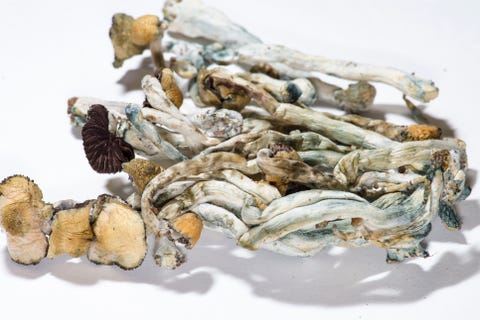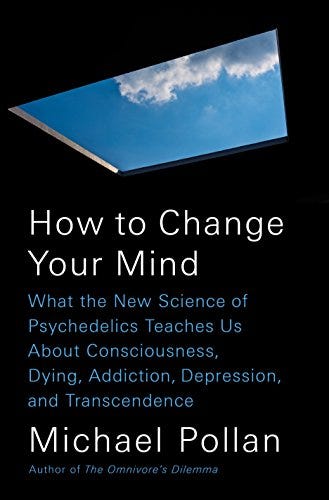Twenty-nineteen could be the Year of the Magic Mushroom. In Colorado and Oregon, efforts are currently underway to get voters acquainted with and in support of psilocybin, the compound that makes magic shrooms, well, magical. Research has begun, and the Food and Drug Administration (FDA) has registered its interest.
You can draw comparisons between growing support for psychedelic mushrooms and the push for recreational marijuana. Both are considered highly dangerous by the federal government, although scientific research and anecdotal evidence indicate otherwise. Both could have fascinating and potentially life-changing medical uses, and the stigma around each is being challenged. However, advocates for psilocybin acknowledge that it is a more complex and less understood substance than cannabis. (And that’s not to mention the risk of experiencing an excruciatingly bad trip.) With that in mind, their efforts hinge on decriminalization and regulated medical use, not full legalization.
Marijuana, which has been voted into legalization in 10 states plus D.C., might be light-years ahead, but psilocybin seems to be the next illicit drug in line to take on the legalization battle. As that conversation amps up, here’s what you need to know about psychedelic shrooms in 2019.
Why is Psilocybin Illegal?
Psilocybin is a Schedule I drug. That means the federal government thinks it has a high risk of abuse with no known medical benefit. It is 100 percent illegal, and possessing it is a felony offense. (Marijuana is also Schedule 1, as are drugs including heroin, ecstasy, and quaaludes.)
Shrooms—along with essentially every other drug, psychedelic or otherwise—have had a bad rap ever since the hazy hippie days of the ’60s. However, last year, researchers from Johns Hopkins University made headlines when they recommended that the FDA reclassify psilocybin as a Schedule IV drug, alongside drugs like Xanax and Tramadol that have a low risk for abuse. The researchers also said that psilocybin could have therapeutic benefits, which we’ll only discover if more research is conducted.

Getty ImagesIgorChus
What Does Current Research Suggest About Psilocybin?
In late 2018, the FDA reviewed the work of a medical company experimenting with psilocybin to treat depression and upgraded the psychedelic to “breakthrough therapy” status, meaning the FDA acknowledged its potential and vowed to expedite its review process. That’s a big deal, because past and present research has shown that psilocybin could be the mother-lode when it comes to treating mental disorders. One study showed a single dose of psilocybin could assist cancer patients in combating anxiety and dark moods. Psilocybin could help users kick drug, alcohol, and nicotine addictions, according to another batch of studies. Research on the use of psychedelics (including psilocybin) to treat depression and anxiety has been very promising.
In other words, psilocybin has the FDA’s initial stamp of approval, and researchers are eager to further unpack its medical benefits. Even the practice of micro-dosing shrooms, LSD, and other psychedelics is creeping into the mainstream.
What’s Happening in Oregon and Colorado?
This brings us to current grassroots efforts to get psilocybin ballot initiatives in front of voters in Colorado and Oregon.
In Colorado, the movement is limited to the city of Denver, which decriminalized marijuana in 2005. Advocates for decriminalizing psilocybin say they have collected enough signatures to make the May 7, 2019 municipal ballot. To make the ballot, 4,726 verified signatures were required; the Decriminalize Denver campaign said it turned in that many and then some. On February 1, the Denver Elections Division confirmed Denver residents will vote this spring on an initiative to make the use of psilocybin for adults 21 and older the “city’s lowest law-enforcement priority.” It would allow adults 21 and older to possess and grow mushrooms, but retail sales would be prohibited.

In Oregon, advocates are calling for reduced criminal penalties for using and possessing illegal psilocybin, as well as the legalization of its use by adults 21 and over when supervised by a licensed facilitator. That would open the door for psilocybin medical treatments when approved by a physician. The Oregon PSI 2020 campaign said it needs to collect 140,000 valid signatures to get its initiative on the 2020 state-wide ballot; it started collecting signatures in December.
In California, a statewide initiative to decriminalize psilocybin failed to get enough signatures to make the 2018 ballot.
Weirdly enough, a 2005 court case ruled that growing hallucinogenic mushrooms is not illegal in the state of New Mexico. However, altering them—i.e. drying them out—and selling them is illegal.
What is it Like to Take Shrooms?
Everyone’s personal journey with psilocybin is unique. But for a highly detailed account of one man’s magic mushroom trip, check out Michael Pollan’s 2018 book How to Change Your Mind: What the New Science of Psychedelics Teaches Us About Consciousness, Dying, Addiction, Depression, and Transcendence. You can find an excerpt describing his experience at the Atlantic, which includes the phrase: “I felt as though I were communing directly with a plant for the first time.” Stay safe out there.
From: Esquire US
Source: Read Full Article
